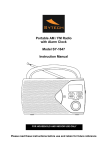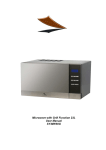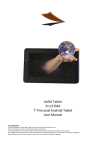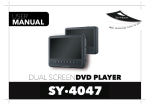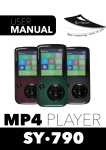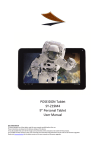Download User manual
Transcript
LEGAL INFORMATION Copyright © 2013 SYTECH All rights reserved. No part of this publication may be quoted, reproduced, translated or used in any form or by any means, electronic or mechanical, including photocopying and microfilm, without the prior written permission of SYTECH SYTECH reserves the right to make modifications on print errors or update specifications in this guide without prior notice. Some of the contents in this manual may differ from your phone depending on the software of the device or your service provider. WELCOME Welcome to Sytech! Thank you for purchasing the new Smart Phone ABYSS by SYTECH. Please read this manual carefully before operating your product and pay close attention to the precautions which are mentioned below. Store this user manual in a safe place for future reference. 1 CONTENTS FOR YOUR SAFETY .................................................7 General Safety .............................................................. 7 Distraction ..................................................................... 8 Driving...................................................................... 8 Operating Machinery ................................................ 8 Product Handling ........................................................... 8 General Statement on Handling and Use ................. 8 Small Children ........................................................ 10 Demagnetization .................................................... 10 Electrostatic Discharge (ESD) ................................ 10 Antenna ................................................................. 10 Normal Use Position .............................................. 10 Air Bags ................................................................. 10 Seizures/ Blackouts ................................................ 11 Repetitive Motion Injuries ....................................... 11 Emergency Calls .................................................... 11 Loud Noise ............................................................. 11 Phone Heating ....................................................... 12 Electrical Safety ........................................................... 12 Accessories............................................................ 12 Connection to a Car ............................................... 12 Faulty and Damaged Products ............................... 12 Interference ................................................................. 13 General Statement on Interface.............................. 13 2 Pacemakers ........................................................... 13 Hearing Aids ........................................................... 13 Medical Devices ..................................................... 13 Hospitals................................................................. 14 Aircraft .................................................................... 14 Interference in Cars ................................................ 14 Explosive Environments ............................................... 14 Petrol Stations and Explosive Atmospheres ............ 14 Blasting Caps and Areas ........................................ 15 GETTING STARTED ............................................... 16 Keys Explained ............................................................ 17 Starting up ................................................................... 18 Installing the SIM/SD Card and Battery ................... 18 Removing the Battery and SIM/SD Card ................. 20 Charging the Battery ............................................... 20 Switching to Sleep Mode ........................................ 23 Waking Up Your Phone .......................................... 23 Getting Around Your Phone ......................................... 24 Touch Control ......................................................... 24 Home Screen.......................................................... 24 Status and Notification Icons................................... 28 Using the Notification Panel .................................... 29 PHONE CALLS ....................................................... 30 Calling from the Phone ........................................... 30 Calling from Your Contacts ..................................... 31 3 Calling from a Text Message .................................. 33 Receiving Calls ............................................................ 33 Answering a call ..................................................... 33 Muting the ringtone during an incoming call............ 34 Muting the microphone during a call ....................... 34 Turning the Speakerphone On/Off.......................... 34 Ending a Call ........................... ............... ............... 35 CONTACTS ............................................................. 35 Creating a Contact....................................................... 35 Searching for a Contact ............................................... 35 MESSAGING ........................................................... 36 Sending an Message ................................................... 36 Message Settings ........................................................ 37 Touch Screen Input Settings........................................ 37 CONNECTING TO THE INTERNET ........................ 38 Turning On Wi-Fi ......................................................... 38 Connecting to a Wi-Fi Network .................................... 39 USB tethering & portable hotspot................................. 41 Enabling USB tethering .......................................... 41 Disabling USB tethering ......................................... 41 Enabling the Wi-Fi Hotspot ..................................... 42 BROWSING THE INTERNET ..................................43 Browsing Options ........................................................ 44 Using Bookmarks ........................................................ 44 Editing a Bookmark ................................................ 45 4 Deleting a Bookmark .............................................. 45 BLUETOOTH .......................................................... 45 MULTIMEDIA .......................................................... 48 Taking Pictures with Your Camera ............................... 48 Listening to Your FM Radio .......................................... 48 Playing Your Music ...................................................... 49 Opening Your Gallery................................................... 50 Playing Your Videos ..................................................... 50 Creating Voice Memos ................................................. 50 PHONE SETTINGS ................................................. 51 Setting Date and Time ................................................. 51 Display Settings ........................................................... 51 Audio Profiles Settings ................................................. 52 Language Settings ....................................................... 52 Switching Network Modes ....................................... 53 Switching Networks ................................................ 53 Security Settings .......................................................... 54 Disabling the Screen Unlock Security. .................... 56 Protecting Your SIM Card with a PIN ...................... 56 Managing Your Device Memory ................................... 57 Privacy: Reset to Factory Settings................................ 58 Applications ................................................................. 58 Installing an Application .......................................... 58 Removing an Application ........................................ 59 Moving an Application ............................................. 59 5 Managing Other Settings ............................................. 59 Text-to-speech Output............................................ 59 Accessibility ........................................................... 60 OTHER APPLICATIONS ......................................... 60 Clock ........................................................................... 60 Calculator .................................................................... 60 SPECIFICATIONS ................................................... 61 DECLARATION OF CONFORMITY ........................ 62 6 FOR YOUR SAFETY General Safety Don‟t make or receive handheld calls while driving. And never text while driving. Don‟t use at petrol stations. Keep your phone at least 15 mm away from your ear or body while making calls. Your phone may produce a bright or flashing light. Small parts may cause a choking. Don‟t dispose of your phone in fire. Your phone can produce a loud sound. Avoid contacting with anything magnetic. Keep away from pacemakers and other electronic medical devices. Avoid extreme temperatures. Switch off when asked to in hospitals and medical facilities. Avoid contacting with liquids. Keep your phone dry. Switch off when told to in aircrafts and airports. Don‟t take your phone apart. 7 Switch off when near explosive materials or liquids. Only use approved accessories. Don‟t rely on your phone for emergency communications. Distraction Driving Full attention must be given to driving at all times in order to reduce the risk of an accident. Using a phone while driving (even with a hands free kit) can cause distraction and lead to an accident. You must comply with local laws and regulations restricting the use of wireless devices while driving. Operating Machinery Full attention must be given to operating the machinery in order to reduce the risk of an accident. Product Handling General Statement on Handling and Use You alone are responsible for how you use your phone and any consequences of its use. You must always switch off your phone wherever the use of a phone is prohibited. Use of your phone is subject to safety 8 measures designed to protect users and their environment. Always treat your phone and its accessories with care and keep it in a clean and dust-free place. Do not expose your phone or its accessories to open flames or lit tobacco products. Do not expose your phone or its accessories to liquid, moisture or high humidity. Do not drop, throw or try to bend your phone or its accessories. Do not use harsh chemicals, cleaning solvents, or aerosols to clean the device or its accessories. Do not paint your phone or its accessories. Do not attempt to disassemble your phone or its accessories, only authorized personnel can do so. Do not expose your phone or its accessories to extreme temperatures, minimum - [5] and maximum + [50] degrees Celsius. The phone's normal operating temperature is -20℃ ~ 60℃ .In order to ensure the normal phone functions, do not use this phone outside the temperature range. Please check local regulations for disposal of electronic products. Do not carry your phone in your back pocket as it could break when you sit down. 9 Small Children Do not leave your phone and its accessories within the reach of small children or allow them to play with it. They could hurt themselves or others, or could accidentally damage the phone. Your phone contains small parts with sharp edges that may cause an injury or may become detached and create a choking hazard. Demagnetization To avoid the risk of demagnetization, do not allow electronic devices or magnetic media close to your phone for a long time. Electrostatic Discharge (ESD) Do not touch the SIM card‟s metal connectors. Antenna Do not touch the antenna unnecessarily. Normal Use Position When placing or receiving a phone call, hold your phone to your ear, with the bottom towards your mouth. Air Bags Do not place a phone in the area over an air bag or in the air bag deployment area. 10 Store the phone safely before driving your vehicle. Seizures/ Blackouts The phone can produce a bright or flashing light. Repetitive Motion Injuries To minimize the risk of RSI when texting or playing games with your phone: Do not grip the phone too tightly. Press the buttons lightly. Use the special features which are designed to minimize the times of pressing buttons, such as Message Templates and Predictive Text. Take lots of breaks to stretch and relax. Emergency Calls This phone, like any wireless phone, operates using radio signals, which cannot guarantee connection in all conditions. Therefore, you must never rely solely on any wireless phone for emergency communications. Loud Noise This phone is capable of producing loud noises, which may damage your hearing. Turn down the volume before using headphones, Bluetooth stereo headsets or other audio devices. 11 Phone Heating Your phone may become warm during charging and during normal use. Electrical Safety Accessories Use only approved accessories. Do not connect with incompatible products or accessories. Take care not to touch or allow metal objects, such as coins or key rings, to contact or short-circuit in the battery terminals. Connection to a Car Seek professional advice when connecting a phone interface to the vehicle electrical system. Faulty and Damaged Products Do not attempt to disassemble the phone or its accessory. Only qualified personnel can service or repair the phone or its accessory. If your phone or its accessory has been submerged in water, punctured, or subjected to a severe fall, do not use it until you have taken it to be checked at an authorized service centre. 12 Interference General Statement on Interface Care must be taken when using the phone in close proximity to personal medical devices, such as pacemakers and hearing aids. Pacemakers Pacemaker manufacturers recommend that a minimum separation of 15 cm be maintained between a mobile phone and a pacemaker to avoid potential interference with the pacemaker. To achieve this, use the phone on the opposite ear to your pacemaker and do not carry it in a breast pocket. Hearing Aids People with hearing aids or other cochlear implants may experience interfering noises when using wireless devices or when one is nearby. The level of interference will depend on the type of hearing device and the distance from the interference source, increasing the separation between them may reduce the interference. You may also consult your hearing aid manufacturer to discuss alternatives. Medical Devices Please consult your doctor and the device manufacturer to determine if operation of your phone may interfere with the 13 operation of your medical device. Hospitals Switch off your wireless device when requested to do so in hospitals, clinics or health care facilities. These requests are designed to prevent possible interference with sensitive medical equipment. Aircraft Switch off your wireless device whenever you are instructed to do so by airport or airline staff. Consult the airline staff about the use of wireless devices on board the aircraft. If your device offers a „flight mode‟, this must be enabled prior to boarding an aircraft. Interference in Cars Please note that because of possible interference to electronic equipment, some vehicle manufacturers forbid the use of mobile phones in their vehicles unless a hands-free kit with an external antenna is included in the installation. Explosive Environments Petrol Stations and Explosive Atmospheres In locations with potentially explosive atmospheres, obey all posted signs to turn off wireless devices such as your phone or other radio equipment. 14 Areas with potentially explosive atmospheres include fuelling areas, below decks on boats, fuel or chemical transfer or storage facilities, areas where the air contains chemicals or particles, such as grain, dust, or metal powders. Blasting Caps and Areas Power off your mobile phone or wireless device when in a blasting area or in areas posted power off “two-way radios” or “electronic devices” to avoid interfering with blasting operations. 15 GETTING STARTED Package contents Before you use your SYTECH ABYSS for the first time; make sure all the contents mentioned below are included. If any of the below is missing, please go back to where the phone was purchased from. Overview 16 Keys Explained Key Function Power Key Home Key Hold to switch audio profiles, or to turn on or off Airplane mode, or to power off. Press to switch your phone to Sleep mode. Press to wake up your phone. Press to return to the Home Screen from any application or screen. Hold to see recently used applications. Menu Key Press to get the options for the current screen. Back Key Press to go to the previous screen. Volume Keys Press or hold to turn the volume up or down. “Menu Key” - Bottom Left Key on the unit “Home Key” - Bottom Centre Key on the unit “Back Key” - Bottom Right Key on the unit 17 Starting up Installing the SIM/SD Card and Battery Switch off your phone before installing or replacing the battery, SIM, or memory card. Make sure the phone is turned off and it is not connected to a computer or external device before installing the SIM/SD card and battery. 1. Remove the back cover. 2. Hold the SIM card with the cut corner oriented as shown and slip it into the card holder. 18 3. Insert the memory card into the card slot with the metal contacts facing down until it inserts to the right position. 4. Insert the battery by aligning the gold contacts on the battery with the gold contacts in the battery compartment. Gently push down on the battery until it clicks into place. 5. Press the cover gently back into place until you hear a click. 19 Removing the Battery and SIM/SD Card 1. 2. 3. 4. 5. Make sure that your mobile phone is off. Remove the back cover. Lift the battery up and out. Slide the SIM card out. Slide the SD card out. Charging the Battery When you first get your new phone you‟ll need to charge the battery. 1. Connect the adapter to the charger jack. Ensure that the adapter is inserted with the correct orientation. Do not force the connector into the charger jack. 2. Connect the charger to a standard AC wall outlet. 3. Disconnect the charger when the battery is fully charged. Sytech recommends you to charge the battery completely before the first use. Batteries usually last longer when they are charged up to a 100% before using. Do not remove the battery while the smartphone is being charged. 20 Battery Maintenance Even though the battery life deteriorates over time, there are certain things which can be done in order to prolong the battery life. Make sure to keep the battery in use. If it is left idle for too long it might not work properly. Avoid using the phone while it is being charged. Charge the battery on a regular basis Make sure the battery is away from all heat sources. If the battery fails, or the phone only works when the adaptor is plugged in, contact your local dealer to have it fixed. Switching Your Phone On/Off Make sure the SIM card is in your device and the battery is charged. Hold the Power Key to switch on your phone. To switch it off, hold the Power Key to get the phone options. Select Power off (1), and then confirm by pressing OK. 21 Setting Up Your Phone for the First Time When you turn on your phone for the first time after you have purchased it or reset it to factory settings (see chapter Sorting out Your Phone Settings – Privacy: Reset to Factory Settings), you will need to adjust a few settings before using it properly. Once the SIM cards have been installed properly, and the battery has been placed in the correct position, you may switch on the phone by pressing the power on key for a few seconds. Once the display turns on and the home screen is loaded, you will be prompted to insert the PIN codes of both the SIM cards. You may change the settings of this through the menu. 22 The mobile phone locks itself automatically when it is left idle for a prolonged period of time. In order to unblock it, swipe the lock to the right towards the “unlock” icon. Tap the Menu Key and then select System settings > Display to change the settings of the lock screen. The default language of the phone is set to Spanish. Tap the Menu Key in the standby mode, then select System settings > Language & input > Language to change the language you want to use, if needed. Switching to Sleep Mode To save battery power, Sleep Mode suspends your device to a low-power-consumption state while the display is off. Your device also goes into Sleep Mode by itself when the display is automatically turned off after a certain period of time. You can enter into the sleep mode pressing the Power Key once. Waking Up Your Phone 1. Press Power Key to activate your screen display once again 2. Tap the icon, and drag it to the right of the screen towards the “unlock” icon. NOTE: If you have set an unlock pattern, PIN or password for your phone (see chapter Sorting out Your Phone Settings – Security Settings) you‟ll need to draw the pattern or enter the PIN/password to unlock your screen. 23 Getting Around Your Phone Touch Control You can use finger gestures to control your phone. The controls on your touch-screen change dynamically depending on the tasks you‟re performing. 1. Tap the buttons, icons, or applications to select items or to open applications. 2. Flick the screen to scroll up, down, left or right. 3. Point, drag and drop to move particular items across the screen. 4. Double-tap the screen to zoom in/out an image. NOTE: You can view the phone screen in portrait or landscape orientation simply by holding it upright or turning it on its side. Not all screens are viewable in landscape. Home Screen In the Home screen, you can set your own wallpaper, add widgets or application shortcuts which you would like to have, or remove them as you wish. 24 Extended Home Screen The Home Screen extends beyond the screen width, giving you loads more space to add more stuff. Simply slide your finger to the left or right and you will see the screen move. Choosing Your Wallpaper 1. Press the Home Key to return to the Home Screen. 2. Tap the Menu Key and select Wallpaper (1), or simply press and hold anywhere on the home screen and a shortcut to the wallpaper option opens up. 25 3. Tap Gallery, Live Wallpapers, Video Wallpaper, or Wallpapers and choose the image or animation you want to use as the wallpaper. Some cropping may be needed for Gallery images. 4. Tap Set wallpaper and the selected item will now be established as your wallpaper. Adding Items to Your Home Screen 1. Press the Home Key > tap to enter the Application Program Interface 2. In the list of applications, touch and hold the icon until the 26 main screen appears (1), move the application icon to the desired position and then release your finger (2). The icon will now be on your home screen so you can access it easily. Removing Items from Your Home Screen 1. Press the Home Key to return to the Home Screen. 2. Tap and hold the item you want to delete until the remove icon appears on the top of the screen. (1) 3. Drag the item to the remove icon and release your finger when the item turns red. (2) The item has now been deleted from the home screen menu. 27 Status and Notification Icons Your phone will tell you exactly what‟s going on by showing you simple icons. Here‟s what they mean. USB connected Missed call Airplane mode Signal strength Battery charge New message Meeting mode Wi-Fi network 28 Alarm set Earphone insert Silent mode Signal searching Bluetooth icon USB debugging connected Data Conn off New Wi-Fi network detected Using the Notification Panel Flick the status bar downwards from across the top of the screen to open the Notification Panel, where you can see your calendar events, new Messages and so on. Tap to open the shortcuts panel from notification panel. To hide the panel, tap on the lower edge of the panel and drag up. To access the shortcuts panel directly from the home screen, use two fingers and drag the screen from up to down and you will see many options which you can activate and/or deactivate. Open/Close Recently-Used Applications 1. Hold the Home key from any screen. The phone will display icons of applications you used recently. 2. Tap the application you want to open. 3. To close a recently used application, simple slide the icon to the right. 29 PHONE CALLS Making Calls There are many ways to make a call with your phone. Calling from the Phone 1. Press Home key > tap > Phone or tap on the Home Screen. 2. Enter the phone number using the on-screen keypad (1). Tap to delete wrong digits. 3. Tap the dial icon (2) and choose from which SIM card you wish to make the call. (3) TIPS: To make international calls, hold to enter the “+”. NOTE: Go into the SIM management application to manage the SIM cards. You may establish the default SIM car or you may activate the option of “Always Ask”. This option will always prompt you from which SIM you wish to dial a number. 30 Calling from Your Contacts 1. Press Home key > tap > People and all the contacts which are recorded on your phone will appear. Each contact will have a colour besides them to indicate in which SIM they are stored. You may, however, dial a SIM 1 contact through SIM 2. 2. Slide your finger to scroll the contacts list and tap the contact name you want to call (1), when the contact details appear, click on the number (2), and choose the SIM card to dial from (3) 31 You can search for a contact by tapping the the bottom of the screen. button at Calling from Your Call Log 1. If you have opened the dialer, touch the call log tab to open the call records. The options of “all, dialed, received, and missed calls” are available. Tap on the option desired and the display then shows a list of the corresponding call records. 2. Tap the dial icon on the right side of the current record and once again select from which SIM you would like to place this call. 32 Calling from a Text Message If a text message contains a phone number that you want to call, you can make the call while viewing the text message. 1. Press Home key > tap > Messaging. 2. Tap the conversation and then find the message that contains the phone number you need. 3. Tap the message, the phone will list the options. Receiving Calls Answering a call When there is an incoming call, the screen will show the contact name (if the number is stored in your contacts list) or otherwise just the number of the incoming call will show up. Note: All the incoming calls will be saved to the call log. To answer an incoming call, drag the white circle in the center of the screen towards the right to answer the call. (As shown in the picture above) 33 Rejecting a call To reject an incoming call, drag the white circle in the center of the screen towards the left to reject the call. You may wish to drag the icon upwards towards the message icon to send a SMS to the person calling. You may choose one of the preset SMS‟s or compose your own SMS. (As shown in the picture above) Muting the ringtone during an incoming call In order to turn off the ringtone during an incoming call, simple press the volume down button once to mute the ringtone. Muting the microphone during a call When engaged in a phone call, you may wish to mute the microphone. At this moment, the other party will not be able to hear you while you may still hear them. Tap to turn your microphone off. To turn your microphone back on, tap again. Turning the Speakerphone On/Off Tap during a call to turn the speakerphone on. Tap again to turn off the speakerphone. 34 Ending a Call Tap to finish a call CONTACTS You can add contacts on your phone and synchronize them with the contacts in your Google account or other accounts that support contact syncing. To see your contacts, Press Home key > tap > People. Creating a Contact 1. Tap from the Contacts Screen. 2. Choose the storage location to save the contact. 3. Enter the contact name, phone numbers, and other information, and then save it. Searching for a Contact 1. Tap in the bottom of the Contacts Screen. 2. Input the contact name you want to search for. The contacts matched will be listed. If no contacts have been matched it means that either you have spelt it wrong or the contact does not exist. See previous section “Creating a Contact” to input the details of a new contact. 35 MESSAGING Your SMS (text message) and MMS (multimedia messaging service) are combined into one menu. Press the Home Key > > Messaging to access the Message inbox. Messages folder Instead of an inbox and outbox, your phone organizes all messages you send and receive into one box, where messages exchanged with the same number are grouped into one message thread in the Messaging Screen. You can tap a thread to see the entire conversation. The small number besides the message indicates how many messages exist in the thread. Sending an Message 1. Press the Home key > tap > Messaging. 2. Tap to create a new message. 3. Enter the recipient‟s number or name. As you type, matching contacts will appear. Tap a suggested contact to add as a recipient. You can also tap to select recipients. 4. Tap Type text message and type your message. Tap Menu Key to insert quick text or contact. If you are sending an MMS, tap Menu Key to add a subject, or tap to attach pictures, videos, audio, or slideshow. 5. Tap to send your message. 36 NOTE: Add an attachment to text message and it will be converted into an MMS automatically. Likewise if you remove all attachments and the subject from an MMS, it‟ll automatically become a text message. Message Settings The phone‟s message settings are pre-configured for you to use immediately. To change them tap the Menu Key > Settings from the Messaging Screen. NOTE: From SMS settings screen tap the Menu Key > Restore default settings to change the message settings back to the original. Touch Screen Input Settings Choose the touch input settings by tapping the Menu Key > System settings > Language & input from Home Screen. In the KEYBOARD & INPUT METHODS section, you can choose the settings you desire. 37 CONNECTING TO THE INTERNET Your phone‟s impressive networking capabilities allow you to access the Internet or your corporate network with ease. You can use default connection settings to connect to the Internet via your mobile network, or Wi-Fi. The network connection can be enabled /disabled manually. Just press Home key > tap > Settings > SIM management > Data connection. Adding a New Network Connection To get connected via your mobile network you need a data plan with your service provider. Also if the networks settings are not pre-configured on your phone, please contact your provider to get the necessary information. You can view settings by pressing Home key > tap > Settings > More > Mobile networks > Access Point Names. Turning On Wi-Fi Wi-Fi provides wireless Internet access over distances of up to about 300 feet. 1. Press Home key > tap > Settings. 2. Click next to the Wi-Fi menu to turn it on, click once again to turn off the Wi-Fi function. (1) 38 Connecting to a Wi-Fi Network In order to browse the internet, you must first connect to a Wi-Fi network. To do this, simply follow the steps below: 1. Press the Home key > tap > Settings > Wi-Fi. When the Wi-Fi is on, the Wi-Fi access points, or “hotspots”, that your phone has detected are displayed with their names and security settings. 2. Tap an access point to connect to it. (2) NOTE: If security features are implemented, you’ll need to enter a password in order to gain access to the network. 39 3. Once the password has been entered correctly the Wi-Fi connection is then established and it will save in the list of Wi-Fi networks. The next time this network is in range it will connect automatically. 4. If a new network is detected at any time it will be indicated. 40 Checking the Wi-Fi Network Status You can check the Wi-Fi network by looking at the icon in the status bar. The bars in the icon indicate the strength of the signal. The more the bars the higher the signal strength. Always try to be in a place with good signal in order to avoid any unnecessary 3G data charge. (Consult your local provider for more information) USB tethering & portable hotspot Share your phone‟s data connection via USB or as a portable Wi-Fi hotspot. Enabling USB tethering TIPS: The PC accesses the Internet via the phone‟s mobile network. Therefore, set up the networks connection correctly before you try to use the phone as a modem. Press the Home Key > tap Menu Key > System settings > More > Tethering & portable hotspot and tick the USB tethering check box. Disabling USB tethering Press Home Key > tap Menu Key > System settings > More > Tethering & portable hotspot and clear the USB tethering check box. You can also just pull out the USB cable. 41 Enabling the Wi-Fi Hotspot You can use the phone as a portable WLAN router, to share your phone‟s internet connection with one or more PC or other devices. NOTE: When the portable Wi-Fi hotspot function is enabled, you can’t use your phone’s applications to access the internet via its Wi-Fi connection. You can configure the Wi-Fi hotspot as follows: 1. Press Home Key > tap Menu Key > System settings > More > Tethering & portable hotspot, click next to the Wi-Fi hotspot to turn it on. 2. Tap Wi-Fi hotspot to set up & manage the portable Wi-Fi hotspot. Now you can find the hotspot on other devices and connect to it. NOTE: When connecting to the Wi-Fi Hotspot, you may be asked to insert a password. Click on the Wi-Fi Hotspot and it will enter into the settings where you will be able to find all information. Disabling the Wi-Fi Hotspot Press Home Key > tap Menu Key > System settings > More > Tethering & portable hotspot and click next to the Wi-Fi hotspot to turn it off. 42 BROWSING THE INTERNET You can use your phone to get on the Internet via a network or Wi-Fi connection. Press the Home Key > tap > Browser. There are different ways to open web pages: Tap the address bar to enter the website you want to browse. Then tap on the touch keyboard. (1) Tap Menu Key > Bookmarks/History and select a bookmark or history to open. 43 Browsing Options When you browse the Web, you can also do the following: Press the Menu Key > Refresh to refresh the current page Press the Menu Key > Home to go back to the homepage Press the Menu Key > Save to Bookmarks to add a bookmark Press the Menu Key > Close and select Quit to exit. Press the Menu Key > Save for offline Reading to store the page to be able to read it without an internet connection Press the Menu Key > Share page to share the page via social media or email. Press the Menu Key > Find on page to find a particular item on a page Press the Menu Key > Request desktop site to view the page as if it were to be viewed on a desktop. Press the Menu Key > Bookmarks/History and select a bookmark or history to open. Press the Menu Key > Settings to configure browser settings. Using Bookmarks If you know the Web address, you can manually add bookmarks. To bookmark a web page, open it and tap Menu Key > Save to bookmarks. Give the bookmark a name and save it. 44 Editing a Bookmark 1. Open a Browser window. 2. Tap Menu Key > Bookmarks/History. 3. Select an item you want to edit and hold on it until the shortcut menu pops up. 4. Select Edit bookmark. 5. Edit the name or location, and then tap OK to save it. Deleting a Bookmark 1. Open a Browser window. 2. Tap Menu Key > Bookmarks/History. 3. Select an item you want to delete and hold on it until the shortcut menu pops up. 4. Select Delete bookmark and tap OK to confirm. BLUETOOTH Bluetooth is a short-range wireless communication technology. Phones or other devices with Bluetooth capabilities can exchange information wirelessly within a distance of about 10 meters. The Bluetooth devices must be paired before the communication is performed. 1. Press Home Key > tap > Settings. 2. Click next to the Bluetooth menu to turn it on (1) When it is on, the icon will appear in the status bar. 45 3. Tap on the Bluetooth function. Your phone will show all visible Bluetooth devices in range. 4. Tap the device you want to pair with (2) and operate according to the message which shows up on screen. When both devices to be paired accept the connection, the pairing process is completed and you may now transfer data. 46 NOTE: Tap your device name to make your phone discoverable if other devices try to pair with your phone. NOTE: All content which is shared is stored in its respective folder. E.g. a picture will be stored in the image gallery. When searching for Bluetooth devices, or connecting to previously paired devices, press the Menu Key to rename the device, set the visibility timeout and show the files received. 47 MULTIMEDIA Taking Pictures with Your Camera Your phone has camera function. Open it by pressing Home Key > tap > Camera. Tap to take a picture. To view it, just tap the picture in the right corner of the screen. You may shift to video mode by pressing e Video camera icon. When you press it the recording commences instantly. To Stop and save the recording, simply press on the Video camera icon once again. Choose from different capture modes on top of the camera screen to select the desired one. You may choose from Auto Capture when Smile is detected, Panorama mode HDR mode and normal mode. All images and videos captured with the camera application are saved to the image gallery. To modify the settings of the camera, press the menu button. Listening to Your FM Radio With the FM Radio, you can search for radio channels, listen to them, and save them on your phone. Note that the quality of the 48 radio broadcast depends on the coverage of the radio station in your area. The wired headset works as an antenna, so always connect the headset when using the radio. To tune in, plug your headset into your phone. Press Home key > tap > FM Radio. Playing Your Music You can play digital audio files from your phone‟s memory card in Music. Before playing music, you need to copy music files to memory card location. 1. Press Home Key >tap > Music to open the Music Screen. 2. Click the Music category label on top of the screen (Albums, Artists, etc.) and then select any music files to start the music playback 3. Adjust the volume with Volume Keys. 4. Press the icon to view in playlist mode. 5. Press the icon to enter into Shuffle mode 6. Press the icon once to repeat all songs, twice to repeat the current song and one more time to turn repeat mode off. 7. Press the Menu Key to view the different options: Party Shuffle Add to playlist Use as ringtone 49 Delete Sound effects Library Opening Your Gallery Press Home Key > tap > Gallery. You can use Gallery to view pictures and play videos. You can also do some basic editing of your pictures – such as setting them as wallpaper or contact photo, and sharing with friends. Playing Your Videos Press Home Key > tap >Video Player. You can use Video Player to play videos on the phone and memory card. Select the video you would like to play and the phone will ask you to complete the acting using which application. Select the desired application and confirm with “Always” or “Just Once” When the playback has begun, you may flip the phone horizontally to view it in landscape mode. Press the Menu Key to select “Stop” or “Loop” Creating Voice Memos Sound Recorder enables you to record your voice memos. 1. Press Home Key > tap > Sound Recorder. 50 2. Tap to start recording. 3. Tap to stop recording. 4. Tap to play back the voice recording. 5. Save the voice recording after you have stopped it, or tap Discard to delete the recording. 6. Tap the icon to view all the saved recordings. PHONE SETTINGS Setting Date and Time 1. Press Home key > tap > Settings > Date & time. 2. Tap Automatic Date & time and select Off if you want to set the time and date by yourself. 3. Set date, time and change the other options. Display Settings Press Home key > tap > Settings > Display, you can adjust the display settings as you like: Lock Screen Notifications: Tick the box to be able to view notifications when the phone is in lock mode. Theme: Select the colour theme for the phone Wallpaper: Select the wallpaper you wish to use 51 Auto-rotate screen: Rotate the screen display as you rotate the phone. Tick or Untick the box as you wish. Brightness: Adjust brightness of the screen DayDream: Select what should appear when the phone is idle Font Size: Select the font size for the phone Sleep: Set the delay for the screen to automatically turn off. Audio Profiles Settings By pressing Home Key > tap > Settings > Audio profiles. Here you can choose from the following options: General Silent Meeting Outdoor When selecting General mode, you can adjust various settings by pressing on the icon Language Settings You can change the language of your phone system in two simple steps. 1. Press Home key > tap > Settings > Language & input > Language. In this option you may select the 52 following: Select a language from the list which is available. Select to activate or deactivate the spellchecker Set the keyboard and input methods Configure the speech settings Configure mouse/Track pad settings Disabling Data Services Press Home key > tap > Settings > SIM management > Data connection, then tap Off. Switching Network Modes 1. Press Home key > tap > Settings > More > Mobile networks > Network Mode. 2. Select one of the following: GSM/WCDMA (auto mode), WCDMA only, and GSM only. Switching Networks 1. Press Home key> tap > Settings > More > Mobile networks > Network operators. 2. Tap the SIM card you want to set. 3. Tap Select manually to register manually, or tap Choose automatically. 4. Once the list of new networks appears, you may connect to them by selecting on the desired one. However some may 53 appear as “forbidden” which means you cannot connect to that particular network. 5. If you decide not to choose any other network, you must activate the data connection once again as it turns off automatically when manually searching for another network Setting Access Point Names To connect to the Internet you can use the default Access Point Names (APN). And if you want to add a new APN, please contact the service provider to find out more. Press Home key> tap > Settings > More > Mobile networks > Access Point Names. Once inside the Access Point Names settings, you may modify them as told by your service provider. NOTE: Do not modify the APN settings without having consulted your service provider previously. The misuse of this function could cause the data connection to stop working completely. Security Settings Here‟s how to protect your phone and SIM card from unauthorized use. 54 Protecting Your Phone with a Pattern 1. Press Home key > tap > Settings > Security >Screen lock > Pattern. 2. Drag your finger to connect at least four dots, and draw the desired pattern. 3. Touch Continue. 4. Redraw your pattern to confirm. Unlocking the Screen with Your Pattern 1. Press the Power Key to wake up the screen. 2. Draw the pattern you set to unlock the screen. If you make a mistake, your phone will ask you to try again. Protecting Your Phone with a Voice unlock 1. Press Home key > tap > Settings > Security > Screen lock. 2. Tap Voice Unlock. 3. Follow the on screen instructions to set the Unlock command and Wake up commands. Unlocking the Screen with Your Voice unlock 1. Press the Power Key to wake up the phone. 2. Speak your unlock command and the phone will get unlocked. 55 Creating a PIN or Password 1. Press Home key > tap > Settings > Security > Screen lock. 2. Tap PIN or Password. 3. Follow the on screen instructions to complete your PIN or password settings. Unlocking the Screen with Your PIN or Password 1. Press the Power Key to wake up the phone. 2. Enter the PIN or password you set to unlock the screen. Disabling the Screen Unlock Security. If you have created an unlock pattern, PIN or password, you can disable it by the following method: 1. Press Home key > tap > Settings > Security > Screen lock. 2. Draw the screen unlock pattern or enter your PIN/ password you have created if required. 3. Tap None. 4. The screen unlock security is now disabled. Protecting Your SIM Card with a PIN Every SIM card comes with a PIN. The initial PIN is provided by 56 your mobile phone carrier. It‟s best to lock your SIM card as soon as you can. 1. Press Home key > tap > Settings > Security > Set up SIM card lock. 2. Choose the SIM card you want set. 3. Tick the Lock SIM card check box. 4. Enter the PIN you‟ve been given and tap OK. TIPS: If you enter the wrong SIM PIN more times than allowed, your SIM card will be locked and you cannot access the mobile phone network. Contact your operator for a PIN Unlock Key (PUK) to restore the SIM card. Changing Your SIM PIN You can change the PIN you‟ve been given to one easier for you to remember and harder for others to guess. 1. Press Home key > tap > Settings > Security > Set up SIM card lock. 2. Choose the SIM card you want set. 3. Make sure you already have ticked the Lock SIM card check box. 4. Tap Change SIM PIN and enter the new PIN. Managing Your Device Memory Press Home Key > tap > Settings > Storage. 57 You can view the space information of the SD card and the phone storage. Unmount SD card: You can unmount the SD card to safely remove it. Erase SD card: Erase all data on the SD card. Privacy: Reset to Factory Settings Press Home key > tap > Settings > Backup & reset > Factory data reset > Reset phone > Erase everything. WARNING: All your personal information and downloaded applications on your phone will be erased after the resetting. Applications Press Home Key > tap > Settings > Apps. Installing an Application You can install a non-Marketing application if you have allowed the installation of it. Make sure that you select an application developed for your device and processor type before installing it. 1. Copy the application file to the SD card and install the card on your phone. 2. Press Home key > tap > File Manager, and open the folder where the application file is. 3. Tap the file to start installation. 4. Read the installation instructions that come with the 58 application and follow it to complete the setup. NOTE: please take your handset as the standard. Removing an Application 1. Press Home key > tap > Settings > Apps. 2. Select the application you want to delete. 3. Tap Uninstall and OK to confirm. Moving an Application You can move the applications downloaded or installed on your phone to the memory card when the phone memory is full. You can also move applications to your phone if the memory card is getting full. NOTE: Not all applications can be move to your phone or memory card. 1. Press Home key > tap > Settings > Apps. 2. Click the application you want to move on the Downloaded tab. Managing Other Settings Text-to-speech Output You can set the text-to-speech and voice recognition options by pressing Home Key > tap > Settings >Language & input > Text-to-speech output. 59 Accessibility You can configure accessibility options for accessibility-related applications by pressing Home Key > tap > Settings > Accessibility. OTHER APPLICATIONS Clock Press Home key > tap > Clock, you can view the clock or set the alarm. On the top of the screen there are 3 icons available. Choose between Countdown timer, Clock or Chronometer. Calculator You can use the phone directly to perform simple mathematical calculations. 1. Press Home Key > Tap > Calculator. 2. Click the buttons on the calculator display to perform basic calculations. TIPS: Tap Menu Key > Advanced panel to use the scientific calculation function. 60 SPECIFICATIONS Screen: 5” IPS, G+G, QHD (960x540) CPU Quad Core Cortex A7 1.3Ghz GPU: Mali 400 Internal Memory: 8GB External memory extendible up to 32GB RAM memory: 1GB Lithium Ion Battery: 3,7V/2000mAh Rear Camera: 8.0MP real with flash (13MP interpolated) Front Camera: 2MP real (5MP Interpolated) Dual SIM slot: (GSM / WCDMA) Supported Bands: GSM. 850-900-1800-1900Mhz WCDMA: 900 y 2100Mhz Connectivity: Wi-Fi 802.11 b/g/n Micro USB Earphone connection 3.5mm Bluetooth V3.0 3G (WCDMA), 2G (GSM) GPS and A-GPS Operating System: Android 4.2.2 Jelly Bean Technical Specifications: Dimensions: 145 x 74 x 10mm Weight: 178g (Battery Included) 61 DECLARATION OF CONFORMITY Manufacturer Name: Satyatrade S. L. Address: Pol.Ind.La Raya. C/ Guadalquivir, 2. Camarma de Esteruelas, 28816 Madrid Tel: 902 430 967 Fax: 91 8864285 NIF: B83254763 Manufacturing country: China Description: Smart Phone Sytech® SY-SP5Q81 ABYSS complies with the following directives: ROHS Standard: 2011/65/EC R&TTE: Directive 1999/5/EC EN 62311:2008 EN50360:2001 + AC:2006 + A1:2012 EN62479:2010 EN60950-1:2006 +A11:2009 + A1:2010 + A12:2011 ETSI EN301 489-1 V1.9.2 (2011-09) ETSI EN301 489-3 V1.4.1 (2002-08) ETSI EN301 489-7 V1.3.1 (2005-11) ETSI EN301 489-17 V2.2.1 (2012-09) ETSI EN301 489-24 V1.5.1 (2010-10) ETSI EN300 328 V1.7.1 (2006-10) ETSI EN300 440-2 V1.4.1 (2010-08) ETSI EN301 511 V9.0.2 (2003-03) EN 301 908-1 V5.2.1 (2011-05) EN 301 908-2 V5.2.1 (2011-07) Signed: Ajeet Nebhwani Utamchandani Sole Administrator 62
































































